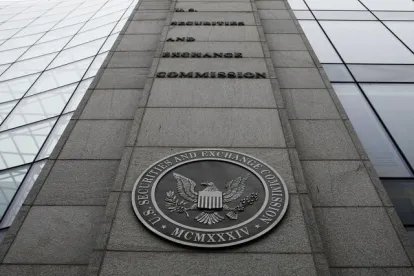On December 22, 2020, the U.S. Securities and Exchange Commission (“SEC”) finalized a new “Marketing Rule” under the Investment Advisers Act of 1940 (the “Advisers Act”) that overhauls the traditional Advertising Rule under Rule 206(4)-1 and the Cash Solicitation Rule under Rule 206(4)-3. The new Marketing Rule represents a significant change to how investment advisers can market themselves and their products, including how advisers to private funds such as private equity, venture capital and hedge funds can present their performance information. The SEC also has made related amendments to Form ADV, the investment adviser registration form, and Rule 204-2, the books and records rule.
As summarized in the corresponding press release (found here), the new rule merges the Advertising Rule and the Cash Solicitation Rule and replaces the traditional broadly drawn limitations with principles-based provisions designed to accommodate the continual evolution and interplay of technology and advice. The staff of the Division of Investment Management will withdraw decades of no-action letters and other guidance addressing the application of the Advertising and Cash Solicitation Rules, as those positions are either incorporated into the final rule or will no longer apply. A list of such letters will be available on the SEC’s website.
The new Marketing Rule was adopted with a number of modifications from the proposed rule published in November 2019. Important differences from the proposal include:
-
not expanding the definition of advertisements to one-on-one communications
-
internal review and written approval of advertisements is not required prior to dissemination
-
no separate requirement for performance advertisements used with retail versus non-retail clients, and
-
loosening of the requirements for advertisements to display predecessor performance
The Marketing Rule, amended books and records rule, and related Form ADV amendments will be effective 60 days after publication in the Federal Register. The SEC has adopted a compliance date that is 18 months after the effective date to provide a transition period to comply with the amendments.
The New Marketing Rule under the Advisers Act
Definition of Advertisement
Under the Marketing Rule, the definition of “advertisement” contains two prongs. The first captures communications that offer advisory services that were traditionally covered by the Advertising Rule. The second prong is designed to capture compensated testimonials and endorsements.
Offering Advisory Services
-
Under the first prong, the definition includes any direct or indirect communication an investment adviser makes that: (1) offers the investment adviser’s investment advisory services with regard to securities to prospective clients or private fund investors or (2) offers new or additional investment advisory services with regard to securities to current clients or private fund investors.
Important Exclusions from the Definition of an Advertisement:
-
One-on-One Communications. The SEC excluded one-on-one communications from the first prong of the Marketing Rule under most circumstances in response to negative comments regarding the proposed rule. Because of specific concerns raised by hypothetical performance, inclusion of hypothetical performance information would not qualify for the one-on-one exclusion unless it was provided in response to an unsolicited investor request or to a current or prospective investor in a private fund advised by the investment adviser.
-
Extemporaneous, live, oral communications
-
Information contained in a statutory or regulatory notice, filing or other required communication and
-
Communications regarding registered investment companies (i.e., closed-end funds, ETFs and mutual funds) and business development companies
Compensated Testimonials and Endorsements
-
Under the second prong, the definition generally includes any testimonial or endorsement for which an adviser provides compensation. This includes cash and non-cash compensation paid directly or indirectly by the adviser (e.g., directed brokerage, awards or other prizes, and reduced advisory fees). Importantly, compensated endorsements and testimonials will satisfy the definition of advertisement regardless of whether the communication is made orally or in writing or to one or more persons.
Testimonials and Endorsements
In perhaps the most stunning reversal of the prior advertising regime but consistent with the proposed rule, the Marketing Rule now permits the use of testimonials and endorsements in an advertisement provided the adviser complies with certain disclosure, oversight and disqualification provisions. We can only imagine the number of possible celebrity endorsements in the future. Adviser Chief Compliance Officers should get ready for questions. Below are the relevant definitions.
-
The final definition of Testimonial includes any statement by a current client or private fund investor about the client’s or private fund investor’s experience with the investment adviser or its supervised persons.
-
The definition of Endorsement includes any statement by a person other than a current client or private fund investor that indicates approval, support or recommendation of the investment adviser or its supervised persons or describes that person’s experience with the investment adviser or its supervised persons.
-
Testimonials and endorsements also include statements in an advertisement about an adviser or its supervised person’s qualities (e.g., trustworthiness, diligence or judgment) or expertise or capabilities in other contexts, when the statements suggest that the qualities, capabilities or expertise are relevant to the advertised investment advisory services. The definitions of testimonial and endorsement also include solicitation and referral activities drawn from the definition of solicitor.
There are four primary conditions for testimonials and endorsements:
-
Disclosure. Advertisements must clearly and prominently disclose whether the person giving the testimonial or endorsement (the “promoter”) is a current client or investor and whether the promoter is compensated. Additional disclosures are required regarding compensation arrangements and conflicts of interest. There are exceptions from the disclosure requirements for SEC-registered broker-dealers under certain circumstances as noted below. In a break from the
Cash Solicitation Rule, the disclosure requirement does not require delivery of a client disclosure by the promoter, as the obligation rests with the adviser to deliver or have a reasonable belief that the promoter delivers the required information. In another break from the Cash Solicitation Rule, advisors will no longer need to obtain a signed client acknowledgment. -
Written Agreement. An adviser must enter into a written agreement with promoters, except where the promoter is an affiliate of the adviser or the promoter receives de minimis compensation (i.e., $1,000 or less, or the equivalent value in non-cash compensation, during the preceding 12 months).
-
Disqualification. The rule prohibits certain “ineligible persons” from acting as promoters, subject to exceptions where other disqualification provisions apply. Notably, the disqualification provision does not prohibit persons for actions prior to the effective date of the Marketing Rule; provided, that such person was not otherwise disqualified under the former Cash Solicitation Rule. The disqualification provisions under the Marketing Rule will not apply to a testimonial or endorsement by a person covered under the “bad actor” provisions of Regulation D for a Rule 506 securities offering and whose involvement would not otherwise disqualify the offering under Rule 506. Ineligible persons under the Marketing Rule include persons (and certain associated persons) subject to a disqualifying Commission action or disqualifying event.
-
A disqualifying Commission action includes an SEC opinion or order barring, suspending or prohibiting a person from acting in any capacity under the federal securities laws.
-
A disqualifying event includes certain criminal convictions and orders, including those of other governmental agencies such as the CFTC, that occurred within 10 years prior to the person disseminating a testimonial or endorsement.
-
-
Oversight and Compliance. In providing any testimonial or endorsement the adviser must have a reasonable basis for believing that the testimonial or the endorsement complies with the requirements of the Marketing Rule, including the general prohibitions described above. The written agreement noted above is part of the adviser’s oversight obligations. Adviser Chief Compliance Officers will want to take note of these requirements.
Exemptions for Testimonial and Endorsements:
-
De Minimis Compensation. A testimonial or endorsement disseminated for no compensation or de minimis compensation (i.e., less than $1,000) is not required to comply with the written agreement requirement or the disqualification provisions, but must comply with the disclosure and oversight provisions.
-
Affiliated Personnel. A testimonial or endorsement by the adviser’s partners, officers, directors or employees, or a person that controls, is controlled by, or is under common control with the investment adviser, or is a partner, officer, director or employee of such a person is not required to comply with the disclosure or written agreement requirements, but must comply with the oversight and disqualification provisions. In addition, the affiliation must be readily apparent or disclosed at the time the testimonial or endorsement is disseminated.
-
Broker-Dealers. A testimonial or endorsement by a broker-dealer will be exempt from the disqualification provisions under the Marketing Rule so long as the broker is not subject to statutory disqualification under Section 3(a)(39) of the Securities Exchange Act of 1934. In addition, broker-dealers will be exempt from certain of the the disclosure requirements of the Marketing Rule for a recommendation subject to Regulation BI for retail clients and subject to certain conditions for non-retail clients.
Third-Party Ratings
The new rule permits the use of third-party ratings in an advertisement, subject to certain disclosure and other criteria pertaining to the preparation of the rating. The term “third-party rating” is defined as “a rating or ranking of an investment adviser provided by a person who is not a related person (as defined in the Form ADV Glossary of Terms), and such person provides such ratings or rankings in the ordinary course of its business.”
-
An investment adviser may not include a third-party rating in its advertisement unless the adviser has a reasonable basis for believing that any questionnaire or survey used in the preparation of the third-party rating is structured to make it equally easy for a participant to provide favorable and unfavorable responses, and is not designed or prepared to produce any predetermined result.
An investment adviser must clearly and prominently disclose, or the investment adviser must reasonably believe that the third-party rating clearly and prominently discloses: (1) the date on which the rating was given and the period of time upon which the rating was based; (2) the identity of the third party that created and tabulated the rating; and (3) if applicable, that compensation has been provided directly or indirectly by the adviser in connection with obtaining or using the third-party rating (the “disclosure requirement”). In order to be clear and prominent, the disclosure must be at least as prominent as the third-party rating.
Performance Advertising
The Marketing Rule provides some much needed clarity on the use of gross, net, hypothetical, related and extracted performance. While the Marketing Rule varies from the proposed rule in that the retail versus non-retail distinction has been removed, the Marketing Rule largely adopted the proposed rule provisions regarding performance advertising, which generally codified prior SEC no-action letter guidance.
-
Gross and Net Performance. Gross performance may not be used in any advertisement unless the advertisement also presents net performance: (1) with at least equal prominence to, and in a format designed to facilitate comparison with, the gross performance; and (2) calculated over the same time period, and using the same type of return and methodology, as the gross performance. The requirement of showing net performance applies to all advertisements versus just retail advertisements as proposed. With the retention of the one-on-one communication exclusion from the definition of an advertisement, this basically leaves in place the gross and net performance provisions from prior SEC no-action letters. In addition,
-
Model Fees. Model advisory fees can be used to calculate net performance so long as the performance is no better than with the actual fees applied.
-
Time Periods. Other than for private funds, performance results must include results for one-, five- and 10-year periods with equal prominence. Performance must be presented at least as of the most recent calendar year-end. If the portfolio did not exist for all periods, then performance is to include since inception performance. These requirements are a minimum and additional time periods can be disclosed.
-
-
Statements Regarding SEC Approval. Consistent with the proposed rule, the Marketing Rule prohibits any statement, express or implied, that the calculation or presentation of performance results in the advertisement has been approved or reviewed by the SEC in any advertisement containing performance results.
-
Related Performance. Related performance results of one or more related portfolios may only be used if the presentation includes all related portfolios with substantially similar investment policies, objectives and strategies as those being offered in the advertisement, with limited exceptions if the excluded related performance would not result in materially higher performance and does not alter the presentation of any applicable time periods.
-
Extracted Performance. Performance results of a subset of investments extracted from a portfolio may only be used if the advertisement provides, or offers to provide promptly, the performance results of the total portfolio.
-
Hypothetical Performance. Hypothetical performance (which does not include performance generated by interactive analysis tools) may only be used if the adviser adopts and implements policies and procedures reasonably designed to ensure that the performance is relevant to the likely financial situation and investment objectives of the intended audience and the adviser provides (or, if the intended audience is an investor in a private fund, offers to provide promptly) the criteria used and assumptions made in calculating the hypothetical performance, and the risks and limitations of using hypothetical performance in making investment decisions.
-
Predecessor Performance. Predecessor performance may only be used in an advertisement when: (1) the person or persons primarily responsible for achieving the prior performance results manage accounts at the advertising adviser; (2) the accounts managed at the predecessor investment adviser are sufficiently similar to the accounts managed at the advertising investment adviser that the performance results would provide relevant information to clients or investors; (3) all accounts that were managed in a substantially similar manner are advertised unless the exclusion of any such account would not result in materially higher performance and the exclusion of any account does not change the presentation of any applicable time periods prescribed under the Marketing Rule; and (4) the advertisement clearly and prominently includes all relevant disclosures, including that the performance results were from accounts managed at another entity. The adviser must have access to the books and records underlying the predecessor performance and be able to provide them upon demand to the SEC.
Implementation of the above performance requirements is likely to have significant impacts on advisers. Advisers should start evaluating required changes now.
General Prohibitions under Marketing Rule
Consistent with the proposed rule, the Marketing Rule will prohibit the following advertising practices:
-
making an untrue statement of a material fact, or omitting a material fact necessary to make the statement made, in light of the circumstances under which it was made, not misleading
-
making a material statement of fact that the adviser does not have a reasonable basis for believing it will be able to substantiate upon demand by the SEC
-
including information that would reasonably be likely to cause an untrue or misleading implication or inference to be drawn concerning a material fact relating to the adviser
-
discussing any potential benefits without providing fair and balanced treatment of any associated material risks or limitations
-
referencing specific investment advice provided by the adviser that is not presented in a fair and balanced manner
-
including or excluding performance results, or presenting performance time periods, in a manner that is not fair and balanced
-
including information that is otherwise materially misleading.
Takeaways
As noted above, the new Marketing Rule contains a number of differences from the proposed rule originally announced in November 2019. For example, the definition of an advertisement does not include all communications between an adviser and one person (with the exception of many, but not all, communications referencing hypothetical performance). In contrast to the proposed rule, the definition of an advertisement in the final rule no longer includes communications that merely “promote” an adviser’s services. The definition has been narrowed to communications of actual offers of investment advisory services that are “with regard to securities.” The final rule also does not include a one-size-fits all pre-review and approval requirement of all adviser marketing materials before dissemination, but defaults to the existing compliance rule. With the increase of the de minimis compensation amount from $100 to $1,000 for promoters, as well as the broader set of exemptions, advisers should be freer to make use of testimonials and endorsements. The incorporation of the Cash Solicitation Rule into the Marketing Rule will also ease compliance burdens when using promoters. Overall, the final rule contains many improvements to the benefit of advisers.
Although the final rule represents a unanimous vote, Commissioners Lee and Crenshaw noted in their joint public statement that the unanimous vote should not be regarded as a consensus about how best to protect investors from the risks of misleading adviser marketing. The two commissioners cite that the commenter objections to the pre-review requirement were appropriately mitigated by the narrowing of the definition of an “advertisement.” On hypothetical performance, they also took umbrage that the final rule includes “unjustifiable” carve-outs for communications containing hypothetical performance in response to unsolicited requests from retail investors and all one-on-one communications with prospective or current investors in private funds. Specifically for private fund investors, the two commissioners expressed concern that private fund advisers could present hypothetical performance even absent any investor request.






 />i
/>i
